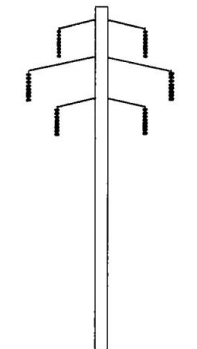| 1. |
Electricity must be used as it is ____________. Unlike other commodities, there is very little ability to store electricity. |
|
|
Generated |
|
|
Extinguish |
| 2. |
The electrical transmission system is _________ complex and dynamic than other utility systems, such as water or natural gas. |
|
|
more |
|
|
less |
| 3. |
The electrical transmission system is more complex and dynamic than other utility systems, such as water or natural gas. |
|
|
True |
|
|
False |
| 4. |

According to the above figure, what is the name of this transmission structure? (Refer to Figure-4) |
|
|
H-Frame |
|
|
Double-Circuit Davit |
| 5. |
New lines are most often constructed with single pole structures because of right-of-way width limitations and environmental considerations. Current right-of way widths vary between ________ to ______ feet. (Refer to page 6) |
|
|
80 to 150 |
|
|
150 to 300 |
| 6. |
The ___________ the voltage, the more power the line can carry on the same size conductor. |
|
|
higher |
|
|
lower |
| 7. |
Growth in a local area’s electricity use may require new distribution substations and new lines to connect them to the existing transmission system, or increased capacity on existing transmission lines. During the past decade, Wisconsin’s growth in electrical demand has ranged between 0 and 2 percent. However currently, there is little to no growth in electrical demand. |
|
|
True |
|
|
False |
| 8. |
What does FERC stand for? |
|
|
The Federal Energy Regulatory Commission |
|
|
The Federal Economics Resolution Commandment |
| 9. |
The determination of which consumers pay the cost of a transmission project depends on the proposed function of the project. Transmission projects can serve one of four main purposes: reliability, economic, generation interconnection, or multi-purpose. |
|
|
True |
|
|
False |
| 10. |
Transmission lines are costly to build and difficult to site. Cities, towns, and counties can help reduce land use conflicts by _____________________?
|
|
|
Identifying future potential transmission corridors and substation sites in new developments Identifying future potential transmission corridors and substation sites in new developments. |
|
|
Do nothing. Because it’s not our responsibility. |
|